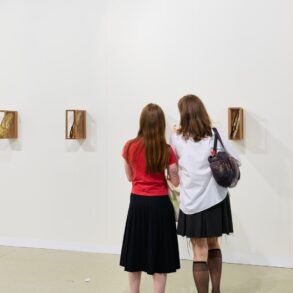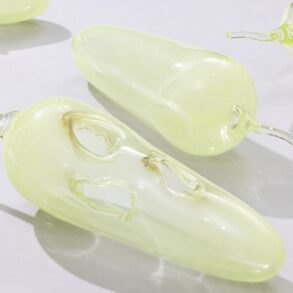Can there be anything more British than making polite chit-chat with a colleague you barely know while waiting for the kettle to boil?
That’s all artist Victoria Culf thought she was doing when she offered to make a cup of tea at Watford Museum last June.
Mother-of-two Victoria, 43, is a warm and chatty stalwart of her community who trained as an art psychotherapist and organises workshops for children.
Her art studio, where (oh, the irony) she teaches others to express themselves, is to be found in her local Scout Hut, with the Scout leaders delighted to offer her the space. It is here that she greets me, offering tea. ‘As you do,’ she says.
Exactly as she did last June when, setting up for an exhibition, she found herself left to her own devices by staff who knew her well.
She had been told to help herself to the tea and coffee-making facilities in a small room downstairs, and was in there when a council employee came in.
Victoria knew the woman vaguely – ‘Not well. I’d met her on a project five or six years ago, but we hadn’t spoken since. I knew she had a child, but I didn’t know anything about her life. Until she started volunteering information about it.’
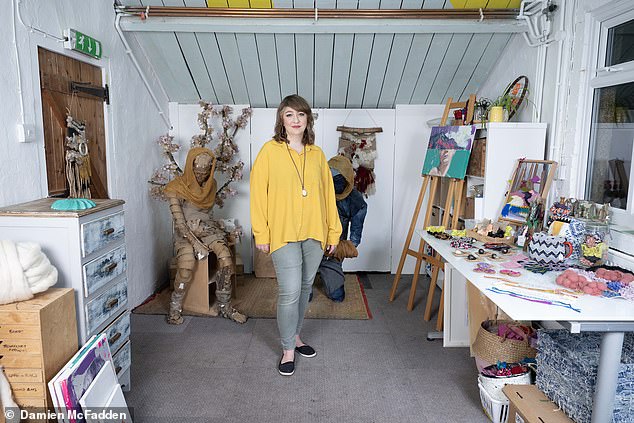
Victoria offered the woman a drink and made conversation while working out where the mugs were. ‘I asked how she was. Then I said ‘And how is the family?’.’
How she must wish she had just stuck to talking about the weather. Because the woman’s response – which Victoria says was to launch into a deeply personal conversation about her child’s gender transition journey – has come close to ruining the artist’s life.
A seemingly innocuous chat (‘mother to mother,’ says Victoria, whose own children are aged ten and six) in which Victoria voiced concerns about underage children undergoing gender reassignment surgery, resulted in her being branded transphobic, reported to the police and even prevented from attending her own exhibition.
She claims she was pilloried on social media when this woman launched a diatribe against her, ‘all because I said I could not support some aspects of this woman’s choices for her child’.
The Victoria I meet is in tears – of anguish, and yes, of rage too – at the thought that her career could now be over.
She is simply bewildered as to how a kindly conversation, ‘in which I was falling over myself to be sympathetic to this woman’, can have led to this: ‘cancellation’ and the vilification of someone who, all evidence suggests, has done nothing legally wrong.
‘The whole thing is simply mad,’ she says. ‘It is Orwellian. My father is a retired police officer and he cannot get his head around it. I was told the police were involved, that an allegation of “harassment” had been made against me. I was distraught, terrified that I was going to be arrested in front of my children.’
It is worth noting that no charges have ever been brought. Nor has Victoria even been questioned about this supposed ‘harassment’. Yet, who can blame her for her worrying that her career is over.
‘The power these people have is just shocking, and if it can happen to me, it can happen to anyone,’ she says.
Victoria, a churchgoer whose work regularly brings her into contact with children in schools, says she knew nothing about the woman’s child when she embarked upon that fateful conversation.
‘I have to stress that I didn’t know anything about her child, who was under 15 when they started [on the transition journey]. I said “Oh OK”, but I probably looked shocked. She went on to say “Oh, we’ve had a lot of encouragement”.’
The woman also shared details about stresses over counselling sessions, the role of the Tavistock clinic and puberty blockers.
This is surely a very personal, and detailed, conversation to be having with a near stranger.
‘Yes, and given what happened next, I’d question whether it’s a conversation she should have been having in the workplace at all,’ says Victoria. ‘But at the time I just felt for her. She was clearly upset.’
Victoria could not agree with the woman’s assertion that her child would be fine now, because they were on a particular path, towards transition.
I said, ‘What’s the hurry?’ I pointed out that children can’t have tattoos until they are 18 so why would you rush into irreversible procedures? I said ‘Look, I’m really sorry, I can’t support this because of my faith, my training, my experience.’
Had the conversation descended into a row?
‘No, and it never did, but she was the one who kept pushing it. I felt I was being educated into agreeing with her philosophy. She talked about the risk of suicide, if you don’t affirm the child’s chosen identity. But my understanding was that in Sweden and Finland, where underage treatment is not available, there had been studies on the suicide rates, and they had not shifted.’
Victoria absolutely denies she was aggressive in her tone, or demeanour. Actually, she says, it was the other woman who kept leaning in, physically, to make her point.
‘We were in a very small space, no bigger than the size of a sofa. I was against the wall and she was leaning on the counter. There was no sense at all that she was harassed, frightened, or upset.
‘And I was trying to be sympathetic. I said, “I’m sorry you are not getting the support you need”, but I simply couldn’t bring myself to say “Of course you are doing the right thing”. I did say “It’s your family, your decisions, of course”.’
How did they part? ‘Having agreed to differ, I thought,’ Victoria says. ‘So the way she reacted next was nonsensical.’
The next morning – on the day of the exhibition – Victoria received an email from the organisers asking her to make sure she delivered all her material before 1.30pm, earlier than she had expected.
‘The woman I’d been speaking to the previous day came out to meet me and stood, arms crossed, saying, ‘You shouldn’t be here. You should have had an email’. I had, but it had just told me to arrive earlier.
‘Eventually she said she would take my material off me. I remember one of my pieces was wrapped in a blanket and she took it off me. Walking back to my car, I noticed a few people – people I knew – staring at me. I thought “How odd”.’
Shortly after this, Victoria received a message cancelling another event she had been booked to do. Strange, again. But then came the phone call that, she says, ‘changed everything’.
‘It was from Watford Borough Council saying there had been an allegation of harassment against me. They were asking me not to go to the museum because the police were involved.’
She was incredulous.
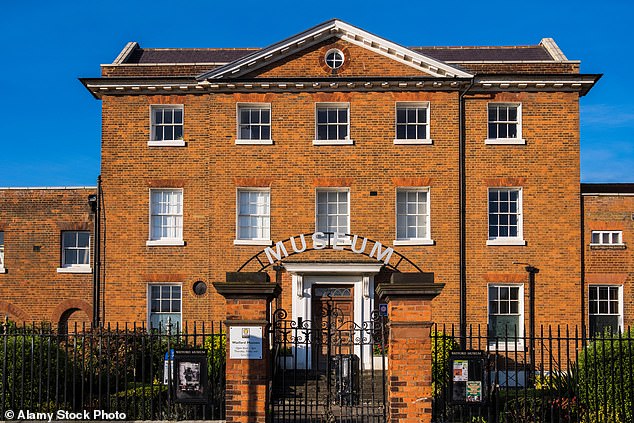
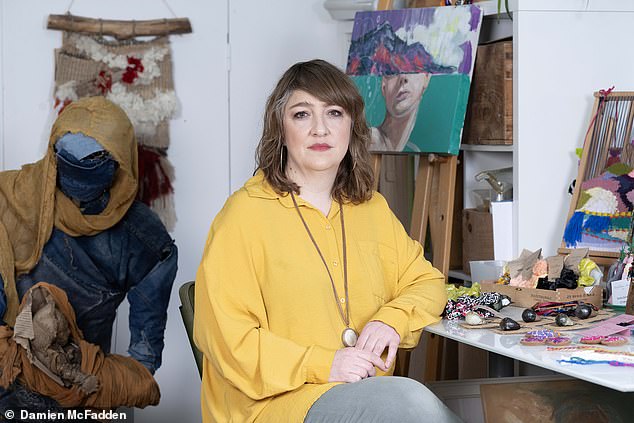
‘Police? I just couldn’t process what was happening. I was then told that if I wanted to go to my own exhibition, I would have to give 24 hours’ notice so they could “safe-guard a council employee”. I said “Hang on a minute. You are banning me from my own exhibition?!”‘
Watford Borough Council disputes that Victoria was ‘banned’ from the exhibition, but accept she was told to give 24 hours’ notice before attending. The council also says it did not itself report her to the police.
Victoria was still waiting for clarification of what was going on when the offended council employee took to social media.
‘She said she had been subjected to a wildly transphobic and homophobic rant whilst at work, and she shouldn’t have to put up with this. I just could not believe that we were talking about the same conversation. These were lies being told about me, and they were being believed by people I thought knew me.’
Victoria is now taking legal action against Watford Borough Council on the grounds of breach of contract, discrimination and harassment. The action also alleges misfeasance in public office, negligence, intimidation, defamation, conspiracy and malicious falsehood.
She is being supported by the Christian Legal Centre, who say they are being asked to help more and more people who have become unwittingly embroiled in the toxic trans row, and are being demonised for perfectly reasonable views.
‘I don’t think there is anything controversial about what I believe,’ she says. ‘I’m certainly not a transphobe. I have worked with trans adults, and never had an issue. I support the rights of adults to live as they chose, but I do feel that when it comes to children who are underage, we have to be careful.’
With a daughter who is about to start secondary school, Victoria admits to a growing sense of unease about the trans ‘movement’, particularly the idea that we should ‘celebrate and affirm’ the idea of gender transition in underage children.
‘I feel that we are in a culture where the idea of changing gender is being pushed on youngsters. I certainly feel that when it comes to surgery, or puberty blockers we should be saying “Hold on”, because there is a certain amount of attention to come from identifying as trans, which makes it an attractive option for some vulnerable youngsters.’
She adds: ‘Even negative attention is a form of attention. And I’m deeply concerned that this ideology is being foisted on young people from a younger and younger age. It’s almost like a way of socially experimenting on them. They don’t realise that it’s happening.’
Have we reached peak gender row madness? Victoria’s story would certainly suggest so.
She likens what has happened to her to the ‘utter insanity’ that engulfed novelist JK Rowling when she took a position on trans issues. But the Harry Potter author was already a public figure. Victoria’s only stab at public notoriety before this was to upload YouTube videos about how to make your own loom.
‘And I have been thrown under the bus,’ she says. ‘All I wanted to do was make her a cup of tea and show kindness.’
Aside from the legal battle, Victoria has also had to deal with stresses relating to the exhibition.
Unable to access her own artwork, she had asked a friend to take some pictures. When she received these, she was upset to find that some pieces of art had been hung incorrectly. Others were damaged. She has no evidence that this was done deliberately, but points out that these are professional art exhibitors who should know to take care of other people’s work.
‘My professional pride couldn’t accept this. I called and said, “This is not on. I am coming in to fix this”. I thought, Let’s see what happens if I get arrested.’
When Victoria was eventually allowed in, she was dismayed “to see everyone scurrying away. People I had known, and worked with for years, wouldn’t look at me”.
She was close to tears as she tried to repair her work, with the realisation dawning on her that she was being cancelled, having been branded a transphobe.
‘Still no one had asked my side.’ Victoria points out that she lost another commission after an employer terminated her contract, drawing her attention to ‘the company’s inclusion and diversity monitoring form where we support people of all faiths and backgrounds’.
‘The irony! As long as you are not talking about a Christian faith. And what about my beliefs, which are not extreme? They are based on common sense, on fact, on experience, professional experience, too.’
Victoria tells me that she has ‘always’ worked with children. After a fine art degree, she had a stint as a youth worker.
‘Then I trained as an art psychotherapist. I don’t work as one now but that is my background.’
Victoria was at first told that Hertfordshire Police were investigating her not for a crime, but for a ‘non-crime hate incident’.
‘What even is that?’ she asks. ‘And what are the police doing investigating non-crimes?’
She asked for evidence from the council of its own decision-making process – and says this was denied, although Watford Borough Council insists all guidelines were followed.
Eventually, the police said the case ‘did not reach the threshold for investigation’, but questions remain.
‘My work in schools depends on regular DBS (Disclosure and Barring Service) checks. Will this affect them? I wouldn’t blame any school for wanting to run a mile from me.’
Victoria claims she has already lost work, including a major contract. ‘And by speaking out now I am probably risking commercial suicide. But what is happening here is wrong. It’s bullying, and clever bullying.’
Who are the bullies? The wider trans rights movement, she believes.
‘This transgender movement has weaponised empathy and made people feel that if they don’t go along with their beliefs, if they don’t actively champion them, they are in the wrong and deserve to be punished.
‘It’s terrifying that if someone doesn’t like what you say they can take umbrage, use their power to ruin your career.’
Where does Victoria stand now on the trans debate? Her position hasn’t shifted, she says.
‘My attitude is: Don’t foist it on me. I won’t ascribe to this. I’m not going to say it is OK, because is it not. When it comes to children, I don’t think transitioning is the golden ticket some of these groups think it is. What sort of society are we when, if a child stands there and says “I hate who I am”, we rush to help them change it. They use terms like “top surgery”, but what we are talking about is a double mastectomy.
‘These people try to say that your views are wrong. Well, no. What is wrong is preaching this claptrap at children, so that they think there is something wrong with them.’
Tears are flowing now. ‘When does this stop? It’s undemocratic. You cannot say you want to live in a democratic society, then insist you have to be able to do what you want, and no one can oppose it.
‘The trans lobby says “We are in the minority”. How come you are shouting the loudest, then? You are not powerless. You have so much power and you are absolutely manipulating society to believe this madness.’
She feels she has said too much now. Others would shut up in her situation, she agrees.
‘But that would be giving in to the bullies, wouldn’t it?’
A Watford Borough Council spokesman said: ‘Watford is a place for everyone. The town is diverse but, more importantly, it is a place where we get on with each other and are part of a vibrant community.
‘The council is confident that it has acted fairly, reasonably and within the law in relation to this matter but as legal proceedings are continuing, it would be inappropriate to comment further.’
This post was originally published on this site be sure to check out more of their content




